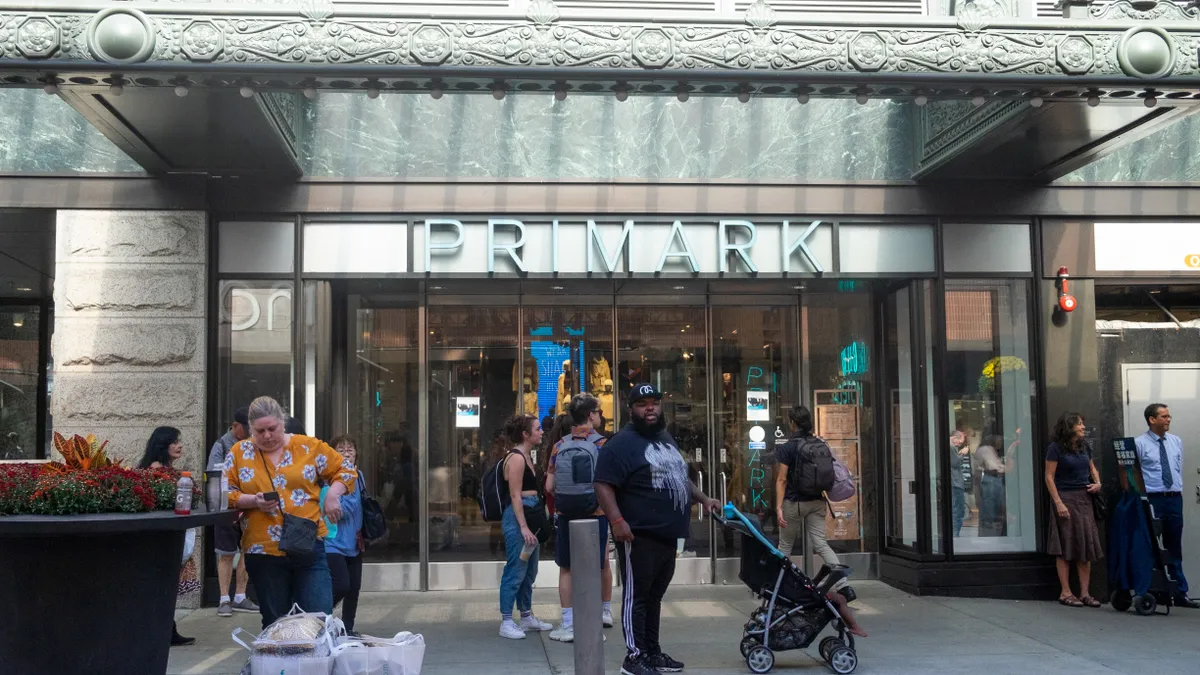Dive Brief:
- Primark has agreed to take on 370 million pounds ($455.5 million) worth of additional finished and in-production items from suppliers, the Dublin-based fashion retailer said in a press release Monday. The move is based on four weeks of "extensive one-to-one conversations" with suppliers, which helped the company "identify mitigating options, including extended payment terms," Primark said.
- Primark also promised to pay for orders in transit or booked for shipment prior to March 18. The retailer said the two moves bring the value of its total stock to nearly 2 billion pounds (nearly $2.5 billion).
- Primark is hopeful it can resume placing orders for fall and winter stock once further guidance is given for reopening stores. The company has more than 370 stores, the majority of which are in Europe, with nine stores in the U.S. and a 10th planned to open this year.
Dive Insight:
When storefronts in the U.S. will be able to fully reopen is entirely dependent upon stay-at-home and other orders from governors. And although e-commerce is bringing in some business, recent data from the U.S. Census Bureau shows March sales at clothing and clothing accessories stores were down 50.7% from last year. Managing potentially overflowing and costly inventories is a top concern.
Reducing planned and scheduled incoming inventory is one of the most immediate actions a procurement professional can take to mitigate this problem. But preserving solid supplier relationships can be a consideration when looking to modify payment terms and orders.
"Companies are starting to have collaborative conversations [on] payment terms," Michael van Keulen, CPO of spend management software company Coupa, told Supply Chain Dive. Companies are moving up payment dates with suppliers, despite the focus on cash and liquidity most businesses have to deal with coronavirus-driven volatility.
"This is very uncommon in a very traditional setting, where you're trying to extend your payment terms and potentially get early payment discounts," van Keulen said. "But we've seen really large organizations accelerating payment, just to help those suppliers that are critical to their business through the stormy weather."
Primark already had more than $1.8 billion of stock in stores, depots and in transit, the company said. The additional commitment means Primark is accepting all product from suppliers planned for handover by April 17.
"We have been in close and regular contact with our suppliers over the last few weeks to find a way forward, and to pay for as much of the previously ordered product as possible," Primark CEO Paul Merchant said in the release. "We were obviously disappointed that we were not initially able to commit to this stock."
H&M was one of the first retailers to publicly commit to accepting orders that were in production or already produced, doing so at the end of March. But H&M paused all orders that had not yet entered production.
At that time, garment factories in Bangladesh alone had received cancellations of more than $3 billion, not including orders that had or would be refused as they arrived at warehouses for delivery.
"We will stand by our commitments to our garment manufacturing suppliers by taking delivery of the already produced garments as well as goods in production," H&M said in a statement emailed to Supply Chain Dive last month. "We will of course pay for these goods and we will do it under agreed payment terms."
Shefali Kapadia contributed to this report.













